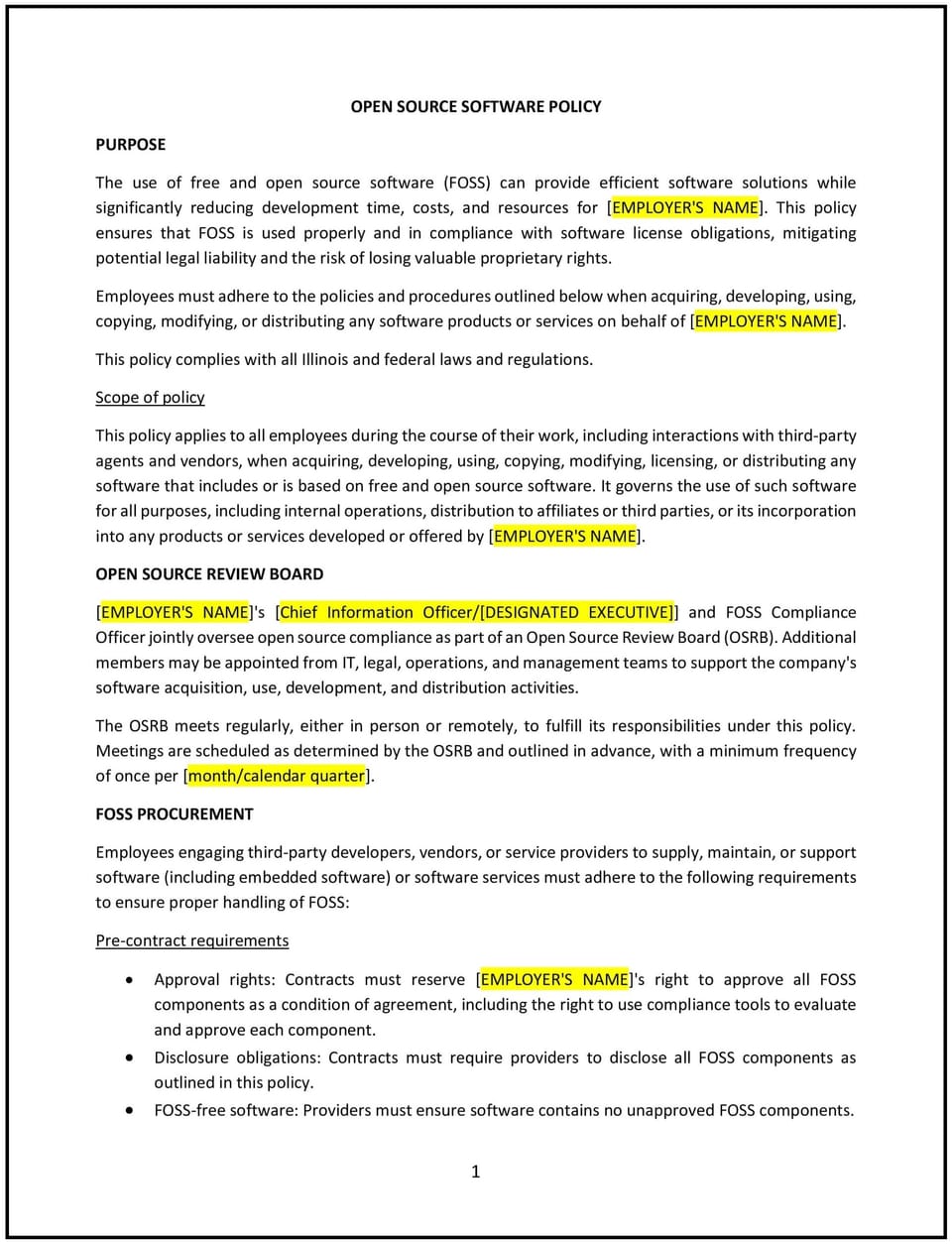Open source software policy (Illinois): Free template

Open source software policy (Illinois)
This open source software policy is designed to help Illinois businesses manage the use, contribution, and distribution of open source software (OSS) in their operations. It establishes guidelines to ensure compliance with licensing requirements, mitigate risks, and align with business objectives.
By adopting this policy, businesses can leverage the benefits of OSS while protecting intellectual property and strengthening compliance with Illinois and federal laws.
How to use this open source software policy (Illinois)
- Define acceptable use: Specify the contexts in which OSS can be used within the organization, such as for internal tools, development projects, or research.
- Address licensing requirements: Require employees to review and adhere to the licensing terms of any OSS used, including attribution, modification, and redistribution obligations.
- Include contribution guidelines: Provide procedures for contributing to OSS projects, such as obtaining managerial approval and following community standards.
- Protect intellectual property: Emphasize measures to safeguard proprietary code and prevent unauthorized sharing of confidential information.
- Require approval processes: Establish a review and approval process for integrating OSS into company projects, ensuring compatibility with business goals and compliance requirements.
- Provide training: Offer training to employees on understanding OSS licenses, compliance risks, and best practices for OSS use.
- Monitor compliance: Regularly review OSS usage to ensure adherence to licensing terms and company policies.
Benefits of using this open source software policy (Illinois)
This policy provides several benefits for Illinois businesses:
- Promotes compliance: Ensures adherence to OSS licensing requirements and reduces legal risks.
- Protects intellectual property: Safeguards proprietary code and prevents unauthorized distribution.
- Enhances efficiency: Leverages OSS to save development time and costs while aligning with business objectives.
- Encourages innovation: Supports the responsible use and contribution to OSS projects, fostering collaboration and growth.
- Reduces risks: Mitigates potential security vulnerabilities and licensing violations through structured guidelines.
Tips for using this open source software policy (Illinois)
- Communicate the policy: Share the policy with employees and make it accessible in the company’s internal systems or employee handbook.
- Encourage documentation: Require thorough documentation of all OSS used, including licenses, versions, and modifications.
- Use compliance tools: Implement tools to track and manage OSS usage, ensuring adherence to licensing terms.
- Train employees: Provide training on identifying OSS licenses, assessing risks, and following the approval process.
- Update regularly: Revise the policy to reflect changes in Illinois laws, licensing standards, or organizational practices.
Q: What is open source software?
A: Open source software is software with source code that is freely available for use, modification, and distribution under specific licensing terms.
Q: Can employees contribute to open source projects under this policy?
A: Yes, employees may contribute to OSS projects, but they must follow the approval process outlined in this policy and ensure compliance with community and licensing standards.
Q: How are OSS licenses reviewed?
A: Employees must review the terms of OSS licenses to ensure they align with company policies and obtain approval before integrating OSS into projects.
Q: What steps are taken to protect proprietary code?
A: Employees are prohibited from sharing proprietary or confidential code as part of OSS contributions and must follow company guidelines to safeguard intellectual property.
Q: Are there restrictions on using certain types of OSS licenses?
A: Yes, the company may restrict the use of OSS with licenses that conflict with business goals or impose significant compliance risks, such as certain copyleft licenses.
Q: How are security risks associated with OSS mitigated?
A: The company conducts regular security reviews of OSS components and implements updates to address vulnerabilities.
Q: How often is this policy reviewed?
A: This policy is reviewed annually or whenever significant changes occur in Illinois laws, OSS licensing standards, or company practices.
Q: Does this policy apply to contractors or third-party vendors?
A: Yes, contractors and vendors working with the company are expected to adhere to the guidelines outlined in this policy.
This article contains general legal information and does not contain legal advice. Cobrief is not a law firm or a substitute for an attorney or law firm. The law is complex and changes often. For legal advice, please ask a lawyer.


